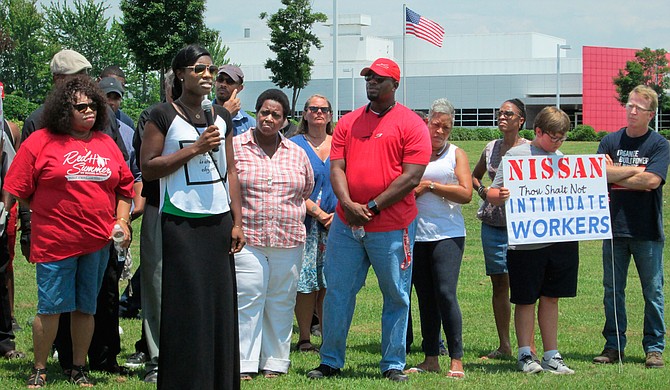Outside the Nissan plant in Canton, clergy, family, friends and workers protest what they call intimindation by company against pro-union workers. Photo courtesy Zachary Oren Smith
Braving 90-degree temperatures and 50 percent humidity, almost three dozen people showed up on Nissan Drive right by the front entrance of the automobile manufacturer to hold what organizers referred to as a prayer vigil urging Nissan to stop using threats in the manufacturer's "anti-union campaign."
"Mississippi is a land (where) the civil rights of people have been denied for too long," said the Rev. Jerome Kyles of New Gordon Chapel. "So we asked pastors, families, friends and fellow Mississippi Nissan workers to stand here today to condemn Nissan's attack on the right to organize a union."
Kyles and other union supporters allege Nissan has pressured and even threatened workers who support bringing in the United Auto Workers Union to represent workers at Canton's Nissan Plant.
One voice in the middle of the six ministers who prayed, sang and spoke at the event, was that of Melody Stewart, whom union officials say is a good example of what happens of how workers often get caught in the line of fire.
Until recently, Stewart worked at Nissan plant as a Kelly Temporary Services worker. Good Jobs First, a Washington, D.C., nonprofit that monitors corporate subsidies, estimated in a 2013 study that one in five of the 4,500 Nissan employees held a temp position, filled by agencies like Kelly.
Stewart, a 36-year-old mother of two, told the Jackson Free Press that she worked at Nissan for about two years. In April, she said she heard from her manager that she was going to be brought up from her Kelly temp position to a regular Nissan payroll position. She said there was a ton of paperwork to fill out, but she was happy about the prospect of a bigger paycheck. While Nissan's temporary employees started work at only about $12 an hour, Nissan's regular payroll production associates made $13.25, rising to $21 an hour after two years. This would translate to maybe some extra money to take her children somewhere during their time off in the coming summer.
When they asked her to take a drug test, she didn't think anything of it. "It's a test that I knew I had to take so why would I jeopardize something like that?," Stewart said. "I've seen people get pulled for random (drug tests), and they'll leave before they even take the test. That's because they know what the (results will be)."
But on April 13, Stewart got a phone call from a human-resources representative at Nissan's Smyrna, Tenn., plant saying she tested positive for cocaine.
"The only thing he told me I could do was argue with HR," she said.
Nissan did not respond by press time to requests to interview a Nissan representative for this story. However, in response to the protest, Nissan sent a general media statement saying: "Nissan is committed to health and safety in the workplace and maintains a zero-tolerance policy for substance abuse. Positive drug tests result in termination."
After contacting Nissan's human-resources department, Stewart went the following day to get her own hair-sample drug test conducted. Those results showed negative for all drugs, including cocaine. She faxed the results to Nissan hoping that she could get her job back. HR explained to Stewart that Nissan will not take into account the results from outside drug tests.
Justin McCreary of the Unitarian Universalist Church of Jackson, in support of the union movement, said Stewart is just one example of what he calls a suspicious pattern of union-affiliated employees "who have been told they tested positive on drug tests by Nissan, only to have a test done by independent labs come back clean."
When contacted about several such alleged instances in April, Justin Saia, the Nissan spokesman told the Jackson Free Press, "To protect the privacy of employees regarding personnel matters, Nissan does not share specific details around such issues. However, Nissan does have a drug-testing policy that is enforced on a consistent basis to ensure the safety of all employees."
"With no union, they have little or no recourse ... but the only way workers will have a fair chance of getting a union, is if Nissan ends its anti-union campaign of interference with these workers' human and civil rights," McCreary said.
In the meantime, Stewart is still looking for a job to help support her kids.
"I was dedicated to them," Stewart said. "I drove an hour-and-10-minute commute to work every day. I wasn't missing work for anything, and to just have your job ripped from you, for something that you don't do?"
Above all, she says that losing her job has taken its biggest toll on her to young children: "We just can't do what we are used to doing. It's hard when you've got to change your life around."


